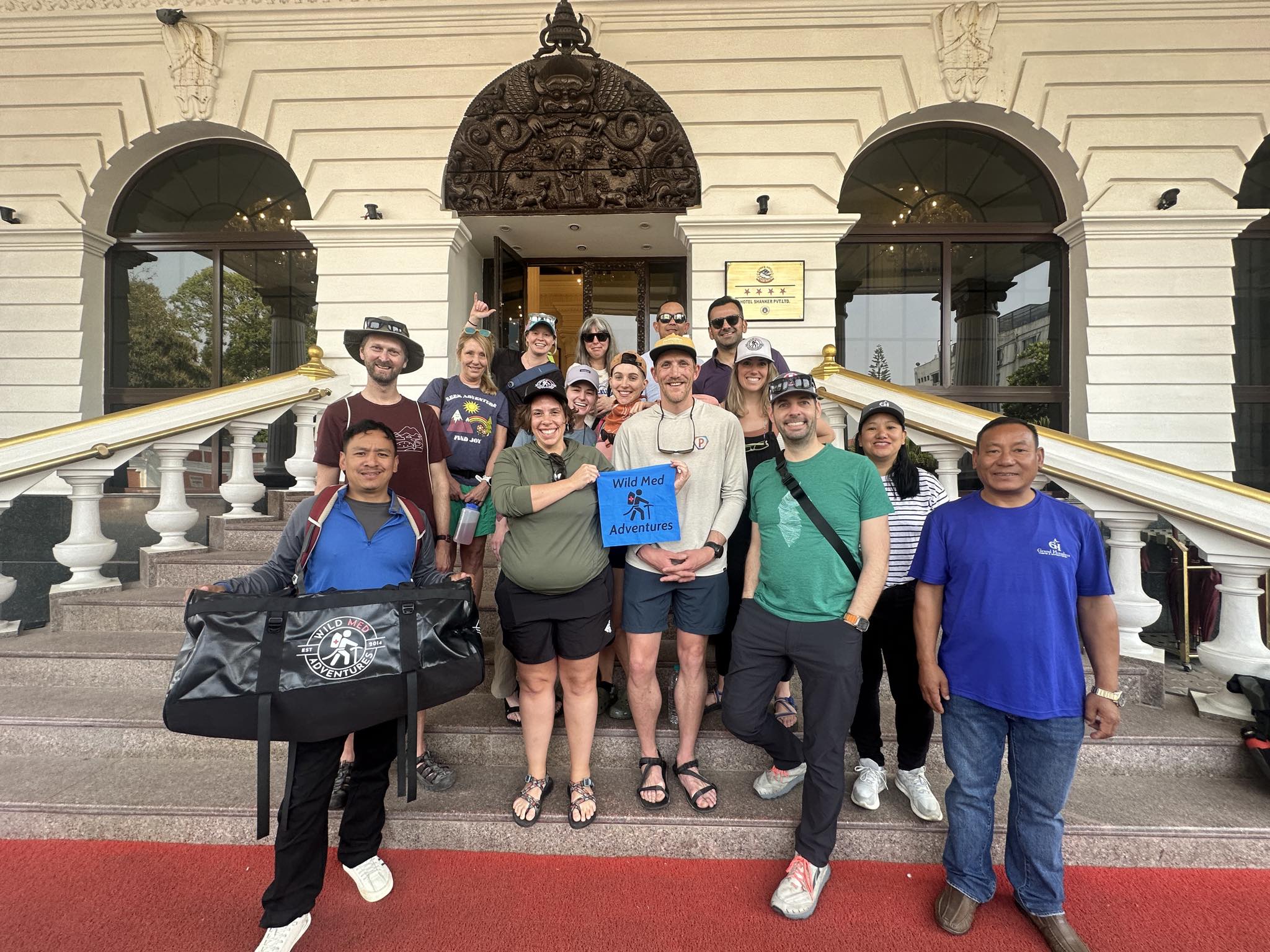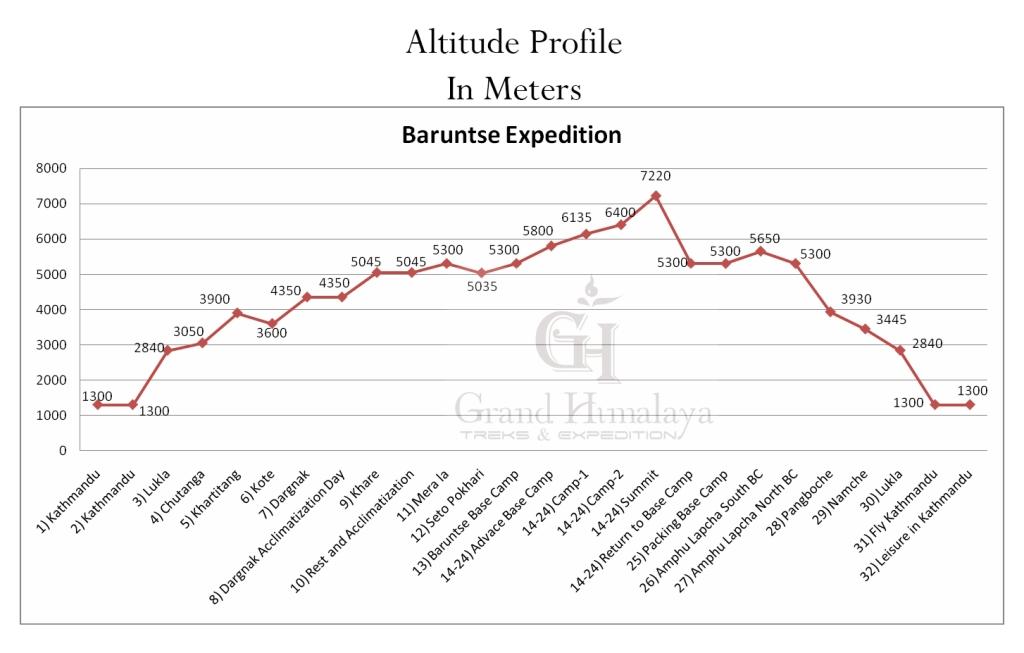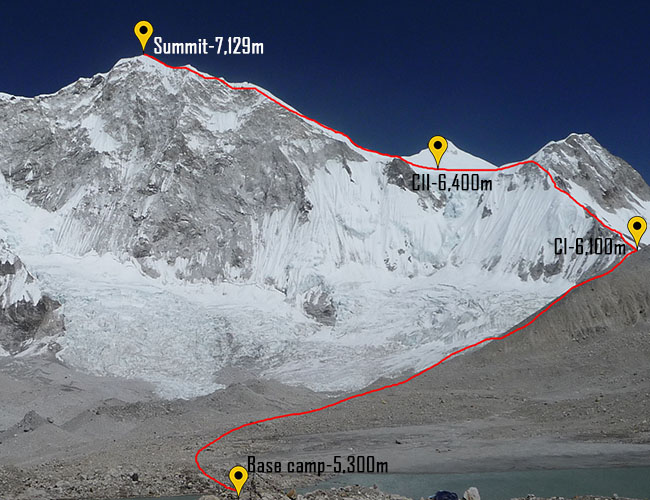

Baruntse (7,129m/23,389ft) is a mountain in the Khumbu region of eastern Nepal; crowned by four peaks and bounded on the south by the Hunku Glacier, on the east by the Barun Glacier, and on the northwest by the Imja Glacier. The mountain was first climbed in May 30, 1954 via the south ridge by Colin Todd and Geoff Harrow of a New Zealand expedition.
This is one of the most beautiful mountain which is situated in the lap of Everest and Makalu Mountain at Khumbu region. At 7129m it is considered a semi-technical mountain but the extreme altitude and several exposed pitches near the summit will make this a very challenging climbing expedition.
The ascent route for Baruntse Expedition is through the southern ridge overhanging the famous West pass; this is in fact the traditional route opened by Hillary and Ship Ton in 1952. The regular approach begins at Lukla and takes you across the Hunku valley, one of the most fertile regions in Nepal, passing northward through a beautiful alpine environment. The walk passes through delightful Sherpa County and provides for excellent acclimatization. The Baruntse base camp is at an altitude of around 5300m and sits near the pristine lakes below Amphu Lapcha pass. The route then follows a long ridge leading to the summit. Generally two camps are set up the approach above base camp for climbing.
From the summit of this mountain presents incredible views of snowy mountains in the surroundings.
An ascent on Baruntse is an adventure for climbers wishing to meet a true Nepalese 7000 meter's Peak.
A very warm welcome to the Kingdom of Himalayas. Upon your arrival at the Tribhuvan international airport our representative welcomes you and assists you transfer in your hotel in Kathmandu. After time to get refreshed, evening you'll meet and transfer for welcome dinner in one of the typical Nepalese restaurant in the heart of Kathmandu i.e. Utsav or Nepali Chula (Kitchen). Here you will not simply experience the traditional Nepalese dish but will be entertained with Nepalese traditional dance and folk songs. After the dinner, you will be transferred back to your respective hotel.
Today the guide and the company's manager will take the opportunity to check the members' personal equipment as the city bazaars and climbing shops will provide the last chance to correct any deficiencies. We'll get organized with the complete expedition documentations, last minute shopping and preparation for departure to the trekking and climbing route.
We 'll make an early morning start for the sixteen-seater Twin Otter flight to Lukla (2,840m/9,317ft), the threshold to the land of legendary Sherpas and the highest mountain on earth, Mt. Everest. This is an exciting 35 minutes flight, which should give a glimpse of Everest in the distance (remember to sit on the left hand side of the plane!). The landing on the tiny airstrip at Lukla is, to put it mildly, exciting. In Lukla, we'll meet our trek staffs and porters. We have our breakfast in Lukla and day rest for acclimatization, where we'll stay in one of the best lodge in full board basis.
After the breakfast, we begin walking for 3 to 4 hours due east from Lukla, passing through a number of tiny hamlets before entering thick forest on the hillside below the Kalo Himal Ridge. Be careful to stay with the group on this section as there are many trails leading away from the main path. There are many streams with numerous places for the first camp, all of which are loosely referred to as Chutanga.
This day you trek 6hrs from Chutanga to Kharka tang (3900m); You trek steep ascent path to cross Zetrala Pass. From here you can enjoy the spectacular views of Numbur Himal (Mountain Range), Mt. Kongdi Ri, Karyolang peak and many other mountains and peaks. Later, we walk along the leveled trail for almost one and half hours and then the trail turns downhill and you trek through this descent path all the way to Zatrabok. This is campsite surrounded by hills.
To reach Kote you trek steep descent until you get to Hinku River from where you are entering now at Hinku Valley and the track gently climbs up. En route, you pass forests of juniper, rhododendron and other local vegetation. The views you can enjoy are of Mera peak, Nauleku peak and many other mountains and peaks.
Today is another short-trek day in which we trek along the ridge of the Hinku Khola in the shadow of Mera Peak. We take lunch at Gondishung, the summer herders' settlement in the west bank of the Hinku Dragnak. Beyond Gondishung we pass a 200 year-old Lungsumgba Gompa where we can find Mera peak scripted in rock along with its route to reach Mera. We will pray for our successful ascent of Mera Peak in the boulder of the Gompa offering incense. A short walk takes us to Dargnak, which is a summer grazing area with the primitive lodges and shops.
Today is our rest day. It is not recommend to stay idle although it is a rest day instead we have to stay active to be ready for next day's adventure. So after breakfast, we hike for about 3 hours up to Charpate Himal Glacier. Seen very close from the Dargnak, Charpate Himal (Kyasar peak) is regarded holy by the Sherpa community and is worshiped by traditional Sherpas of the mountains. We will observe Mera North very close and outstanding from here. After an hour's pleasant hike downwards, we will be back at Dargnak.
We follow the lateral moraine of Dig Glacier to Dig Kharka, which offers spectacular views of Charpate or Kyasar Himal (Mountain Range). The trail climbs through moraines and to the snout of the Hinku Nup (East) and Shar (West) Glaciers and then climbs more steeply to our camping spot at Khare. The camping experience at Khare is something that would cherish us throughout our life. It is pleasure to view beautiful North face of Mera Peak from our campsite at Khare.
This is also the day for acclimatization at Khare for preparation and getting ready to approach Mera La Pass 5350m on the next day. The members accompanied by some sherpas, will do the acclimatization hike up the Khare Ri (Peak) which is around 300 meters higher than the present camp. The view towards the Mt. Amadablam, Mt. Khangtega and Hinku himal (Mountain Range) is simply marvellous.
Today you will travel a short distance, slowly ascending up onto Mera glacier. The climb is initially steep, but flattens out as you reach the crest of the glacier. You will traverse a long flat path on top of the glacier as you make your way to the pass, called Mera La (5,350m/ 17552 ft). From here, the views are stunning. Crevasse fields gently stretch out in front of the pass and you are literally enclosed by a ring of jagged peaks and blue-green glaciers. The remaining route up to the summit of Mera Peak is clearly visible.
After breakfast it’s a walk of steep descent until we arrive at Khongma Dingma and from here we head up into the upper yak pastures of this incredible remote valley. All morning the great flanks of Chamlang dominate on our left, and the spire of Mt. Baruntse comes into view beyond. The terrain is remarkably benign, especially considering we are actually heading directly into the very epicenter of the highest group of mountains in the world. The valley floor remains broad and straight, only gradually rising to the blind alley of peaks ahead. It is almost a shock to realize that the two majestic mountains we are heading straight towards are none other than Everest and Lhotse.
We trek through the high altitude route from Seto Pokhari to Baruntse Base Camp. This is one of the remotest parts of the Himalayas. We rarely meet any trekkers en route except if it is very high touristic season. After nice and gentle walk of around 4hrs from Seto Pokhari Camp, we finally arrive at Baruntse Base Camp (5,300m). Once we reach Base Camp, you will see the expedition crews busy establishing the Base Camp for Baruntse Expedition for whole climbing period.
These days are the major climbing days for you to ascend the summit of most awaited Mt. Baruntse. After some day’s acclimatization and exercise you will be taken to the higher camps to be closer to the summit of (7,129m/23389ft) where you will be provided food for high altitude. You are allowed to trek from lower camp to higher camp or vice versa for more practice and acclimatization. Finally we wish for your success to reach in the summit. Here you get full board service with tented camp accommodation in both camps
Rest day as well as cleaning and drying of equipments. Also the day for some hot bath and shaving. Moreover, it's important to leave least footprints possible for the conservation of the Himalayan environment, We collect all garbage we produced and hand over to the Sagarmatha Pollution Control Committee at Namche.
Hike along the rugged moraine towards Imja Valley. Enjoy the panoramic views of high Himalayan peaks including the Lhotse and Everest toward north-west. Camp at Amphu lapcha Base Camp and prepare for the next day's crossing of the Amphu Lapcha pass. Amphu Lapcha Pass at around 5845 m is one of the highest pass in Nepal, connecting the Hongu Valley with Imja Valley.
An early morning climb. The climb involves steep sections on rock and ice. Cross the Amphu Lapcha pass. It's better to tackle the pass early in the morning when the snow is stable. Use climbing ropes wherever necessary. The last sections of the climb to Amphu Lapcha winds up in snow shelves. On the other side, a steep descent awaits to be endeavored on fixed lines leading down to the moraine.
Walk downhill along the moraine to arrive at Chukung, the starting point for the Island Peak. The wilderness of the remote Hinku Valley gives in to the civilization of Khumbu Region. The Imja Khola joins the Dudh Koshi river a little above the Pangoche village. There is a famous gompa (Monastery) at Pangboche believed to have been the oldest in the Khumbu region.
Following the main Everest trail down the beautifully scenic valley, we pass through Pangboche at the base of Ama Dabkam and cross the river before climbing to the monastery at Tyangboche. Here we will no doubt take advantage of the bakery, as well as spending some time exploring the famous monastery. A circuit of the monastery, with its many prayer wheels is not to be missed, as is an exploration of the inside. From Tyangboche, a steep descent of around 1500ft/500m leads through bird filled rhododendron bushes and fir trees to the Dudh Kosi River. The final steep climb traverses the hill side into Namche Bazaar where we spend the night. Overnight at lodge.
A steep descent for 600m/2,000ft down Namche Hill leads to the suspension bridge crossing the Dudh Kosi River and the small village of Monjo (2,835m/9,300ft). The trail now flattens out and we cross the river twice more before a rising traverse up the hill-side, past numerous tea-houses to Lukla. Our last day of steady trekking will be a real joy as at lower altitudes, with a month behind us, and nothing left to prove, we can soak up the atmosphere in each of the villages we amble through. All excess energy is guaranteed at our party this evening with our Nepalese crew.
Saying final goodbye to our porters, we fly back to Kathmandu after our long mountain journey. The flight time to Kathmandu are scheduled in the morning normally because Lukla suffers a lot of wind afternoon. Sometime the flight time can be delayed due to bad weather and other reasons. The early morning flight drops us at Kathmandu and the Getaway Himalaya van or coach will transfer you to the hotel. You may have time to relax after long journey and take back your breath and rest at your hotel with ending your Himalayan expedition. Remember, we will be hosting a fantastic celebration dinner together in the finest restaurant in Thamel, in occasion of successfully completing your Mt. Baruntse Expedition!
Rest and relax at the hotel after such long strenuous trip. The day is also reserved as a contingency day due to flight delays or other unforeseen conditions. For those eager to see as much of Kathmandu as possible, an early start is worthwhile to visit the temples of Pashupatinath and Swayambhunath and districts of Bhaktapur and Patan. Durbar Square is also on the essential list, as is the shopping area of Thamel. In the evening you can have your last night in Nepal, enjoying the Nepali cultural dinner show or go out to Thamel.
Today is free or last minute shopping for souvenirs or gift to your family, friends or relatives for you until your departure flight/drive or to commence any extra trips or activities you may have booked with us. If departing, you'll be transferred to the International Airport for your departure flight to your onwards destination.

